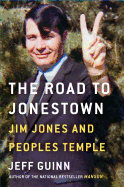
Trumpeting assurances of a Promised Land, Jim Jones welcomed followers into his fold. Using intimidation, fear tactics and blatant falsehoods, he kept them there. The volatile religious leader and his Peoples Temple are the focus of Jeff Guinn's The Road to Jonestown. The former investigative journalist records the electrically charged history of events that led up to November 1978's mass suicide. How could a tragedy of such scale occur in apparent devotion to one man? With the same methodical research and meticulous prose that he brought to the chilling biography Manson, Guinn unravels the bewildering rise and fall of the American cult that inadvertently spawned the admonition "Don't drink the Kool-Aid."
Jones began his career as a Methodist preacher in 1953, at the age of 21, building an early following on ideals of integration and socialism. Over time, however, he evolved into a demagogue, enlisting the aid of his politically savvy wife and several unwavering devotees to set about establishing his Peoples Temple. Guinn doesn't flinch at the gruesome details of the preacher's final stand against interlopers encroaching on his supremacy. By 1977, temple defectors were enlisting the help of Congress to retrieve family members from Jonestown, and newspapers were investigating the colony's leadership. As American forces closed in, Jones pulled the trigger. If he couldn't have his paradise, no one would get out alive.
Entering the minds of megalomaniacal mass murderers is a talent of Jeff Guinn's. Nearly 40 years after the fact, he carefully examines how a reckless obsession with power greedily destroyed those in its sway. One hopes that today's demagogues won't get the same satisfaction. --Dave Wheeler, associate editor, Shelf Awareness

